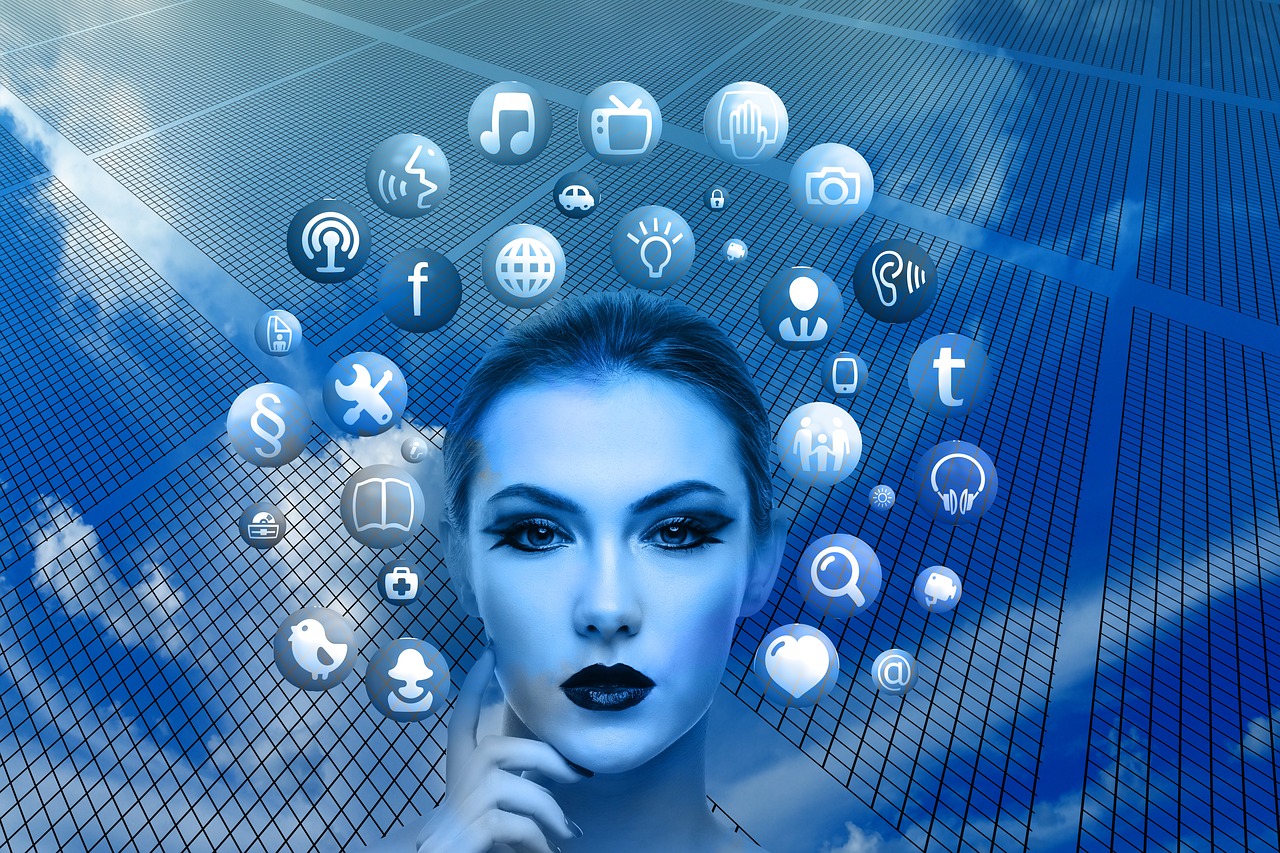Social Media And Mental Health

Humans are social creatures. In order to thrive in life, we need the company of others, and the power of our relationships has a major impact on our mental health. It has the potential to reduce stress, depression, and anxiety, boost self-worth, raise comfort and joy, avoid loneliness, and even lengthen your life by maintaining social connections. However, there is a significant risk to your mental and emotional well-being when you don’t have supportive social networks.
“The Impact of Social Media on Mental Health” delves into this intricate link by examining how our digital interactions impact our emotional and mental states. Social media sites have the power to both benefit and harm our mental well-being.
In the age of digital connectivity, social media platforms have become an integral part of our daily lives and have a significant impact on how we communicate, share information, and see the world. These platforms offer opportunities for self-expression and connection that have never been possible before, but they also have a complicated relationship with mental health, which has sparked discussions and concerns about how they can impact our overall wellbeing.
The essential question of this conversation is balance: how can we use social media to our advantage without jeopardizing our mental health?
it’s important to critically analyze the dynamics at work when we immerse ourselves in the online world, from the spread of fake information and cyberbullying to the phenomena of comparison and self-esteem.
Thinking about your online habits and affecting a healthier balance may be necessary if you find yourself spending too much time on social media and experiencing negative emotions such as sadness, frustration, frustration, or loneliness.
The Pros of Social Media:
While virtual interaction on social media doesn’t have the same mental benefits as face-to-face contact, there are still many positive ways in which it can help you stay connected and support your wellbeing.
1. Connection and Support:
People can use social media platforms to connect with others who share their interests, experiences, or challenges and offer support. This can develop a sense of belonging and support, especially for those who may feel isolated in their offline lives.
2. Community Building:
Social media allows you to create communities around different interests, passions, and causes. The communities offer a platform for individuals to exchange ideas, seek guidance, and find support, which can ultimately lead to the development of trust and acceptance.
3. Access to Information and Resources:
Social media works to share mental health information and resources, including articles, blog posts, podcasts, and support groups. People can gain knowledge about mental health challenges, ways to cope, and accessible resources.
4. Expression and Creativity:
The use of social media platforms allows for the expression and creativity of individuals through photos, videos, art, writing, and other means. Through creative expression, individuals can express themselves in a meaningful and therapeutic manner.
5. Promotion of Positive Messaging and Awareness:
Social media campaigns and movements related to mental health awareness and promotion have gained notoriety in recent years. These initiatives help reduce stigma, raise awareness of mental health issues, and promote messages of self-care, acceptance, and resilience.
6. Peer Support Network:
Peer support groups and forums are a common sight on social media platforms where people can share their experiences, offer advice, and provide support to others facing similar challenges. These networks can provide a sense of solidarity and understanding, reducing feelings of isolation and loneliness.
7. Encouragement of Self-Reflection and Growth:
Engaging in social media posts about mental health can promote self-reflection, personal growth, and introspection. Exposure to different perspectives and experiences can broaden understanding of mental health issues and encourage empathy and compassion for others.
The Cons of Social Media:
Due to its recent innovation, there has been little research into the long-term positive or negative effects of social media. However, a number of studies have discovered a direct correlation between excessive social media use and a higher risk of suicidal thoughts, self-harm, loneliness, anxiety, and depression.
Social media can lead to negative experiences such as:
1. Comparison and Envy:
Social media platforms are commonly used to showcase the highlights of people’s lives, featuring carefully selected images of success, happiness, and perfection. As users scroll through their feeds, they are bombarded with idealized versions of reality, which can lead to unrealistic comparisons. The constant experience of a seemingly perfect life can cause individuals to feel inadequate and unfulfilled in their lives. Studies showing a link between social media use and increased comparison and envy.
Many studies have found a link between excessive social media use and increased jealousy and depression. Research shows that the more time people spend on social networks, the more likely they are to compare themselves to others and experience envy. This envy, fueled by the perception of the apparently perfect lives of others, can contribute to a decline in mental well-being, leading to symptoms of depression and anxiety.
2. Cyberbullying and Harassment:
The online entertainment industry is a common source of cyberbullying, which uses electronic media to harass, threaten, or injure others. Analysis reveals that a wide range of website customers experience various types of cyberbullying, from negative comments to rumors, threats and harassment.
Real-life examples abound illustrating the detrimental effects of online harassment on mental health. Instances of cyberbullying have been linked to increased levels of stress, anxiety, and depression among victims. In extreme cases, cyberbullying has even led to tragic outcomes such as self-harm and suicide, highlighting the urgent need for effective prevention and intervention strategies.
3. Fear of Missing Out (FOMO):
FOMO refers to a pervasive feeling of anxiety or insecurity resulting from the fear of missing out on rewarding experiences or opportunities, often fueled by social media. Excessive use of social media can exacerbate feelings of FOMO, as users constantly compare their lives to seemingly exciting activities and events that others promote online.
Strategies to manage FOMO and reduce its impact on mental well-being include limiting social media use, practicing mindfulness and self-awareness, and developing meaningful offline experiences. By prioritizing authentic connections and activities that align with personal values and goals, people can mitigate the negative effects of FOMO and develop a healthier relationship with social media.
Signs That Social Media is Impacting Your Mental Health:
Have you recently experienced fatigue, anxiety, or stress? It can be related to the way you utilize social media. Social media sites help us communicate and have fun, but they may also negatively affect our mental health. These are some signs that using social media in excess can harm your mental health:
1. Constant Comparison:
Do you frequently use social media to compare your life, looks, or achievements to those of others? Low self-esteem or feelings of inadequacy may result from this.
2. Fear of missing out:
Do you experience worry or anxiety when you see other people blogging about occasions or events that you were either not invited to or were unable to attend? This dread of losing something might exacerbate feelings of isolation or loneliness.
3. Obsessive checking:
Do you find yourself checking your social media accounts nonstop, even if it gets in the way of your everyday tasks or reduces your productivity? Stress levels might rise, and attention can drop as a result of such obsessive activity.
4. Negative Self-Talk:
Do you think about what people are saying about you on social media or talk poorly about yourself? It might be harmful to your mental health and self-esteem to hear negative remarks or comparisons.
5. Cyberbullying:
Have you experienced harassment, bullying, or offensive remarks on social media? Cyberbullying may have a harmful impact on a person’s mental health and general wellbeing.
6. Disturbed Reality:
Are the lives of those on social media platforms perfect or ideal? This may cause you to be unhappy with your life and set low standards for yourself.
7. Sleep disorders:
Do you suffer from insomnia or other sleep problems as a result of using social media in excess, particularly before you go to bed? Your emotions and mental abilities may be impacted by sleep deprivation.
8. Decreased Productivity:
Has using social media excessively caused you to become less productive? Anxiety and disturbances can raise stress levels and cause depression.
9. Physical Symptoms:
Do you have physical symptoms such as headache, eye, or neck pain due to prolonged use of electronic devices on social networks? These symptoms may indicate the need to take breaks and limit screen time.
10. Online Withdrawal Symptoms:
Do you feel anxious, irritable, or depressed when you can’t use social media? These withdrawal symptoms may indicate an addiction to or dependence on online communication.
If you recognize any of these warning signs in yourself or someone you know, it’s important to take steps to correct them. Consider limiting your use of social media, seeking help from friends or mental health professionals, and prioritizing activities that promote overall well-being and positive self-esteem. Remember that it’s okay to take breaks from social media and prioritize your mental health.
Moderating Social Media Use for Better Mental Health
If you feel that your use of social media has become addictive or is increasing your anxiety, depression, FOMO, or feelings of isolation, the following steps can help you change your habits.
1. Setting Boundaries:
Setting healthy boundaries for using Social Media is very important to maintain mental well-being. Setting boundaries hours for social media usage, restricting total activity, and limiting the amount of content you view are all ways to achieve this. By creating clear guidelines for when and how to use social media, people can avoid over-involvement and potentially harmful.
2. Curating Your Feed:
Creating a positive and supportive social media environment involves choosing the accounts and content that will make up your feed. Followers can be encouraged to follow accounts that promote positivity, diversity, and mental health, while those who create negative feelings or comparisons should be unfollowed or mute. By choosing a stream that aligns with personal values and interests, people can create an uplifting and enriching online experience.
3. Practicing Digital Detox:
Taking breaks from social media and regularly disconnecting can have many mental health benefits. By removing themselves from a permanent relationship, people can reduce feelings of overwhelm, comparison, and FOMO. A digital detox enables greater vitality, better focus on real relationships and activities, and improves overall well-being. Incorporating regular social media into your routine can help maintain a healthier balance between your online and offline life.
4. Change your focus:
Many of us use social media only out of habit or as a mindless way to pass the time when we have some free time. However, by focusing attention on your reason for connecting, you can cut down on the amount of time you spend on social media while also boosting your experience and avoiding a lot of its negatives.
If, for example, you’re using social media to share updated pictures of your kids with family, look up a friend who’s been sick, or find specific information, your experience will probably be very different from that of someone who’s just using it out of boredom, to see how many likes you received on a previous post, or to see if you’re missing anything.
While it is important to recognize these positive effects, it is also important to use social media consciously and in moderation to avoid potential negative effects on mental health. Balancing online and offline activities, setting boundaries, and seeking professional support when needed are essential to maintaining the overall well-being of today’s digital agriculture.
Conclusion:
To conclude the discussion, it is important to acknowledge the dual nature of the mental health effects of social media. While it can provide connection, support, and positive experiences, it also carries risks such as comparison, cyberbullying, and FOMO. Understanding this complexity is important to navigating Social Media in a way that prioritizes mental well-being.
Finally, individuals are encouraged to take proactive steps to prioritize their mental well-being when using social media. This includes setting boundaries, maintaining a supportive online environment, and incorporating frequent digital detox methods. By implementing these strategies and taking a conscious approach to using social media, people can harness its positive effects and mitigate the negative effects on mental health.
While it is important to recognize these positive effects, it is also important to use social media consciously and in moderation to avoid potential negative effects on mental health. Balancing online and offline activities, setting boundaries, and seeking professional support when needed are essential to maintaining the overall well-being of today’s digital agriculture.








